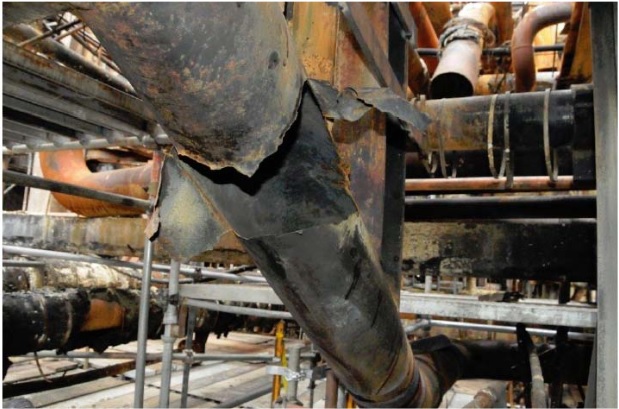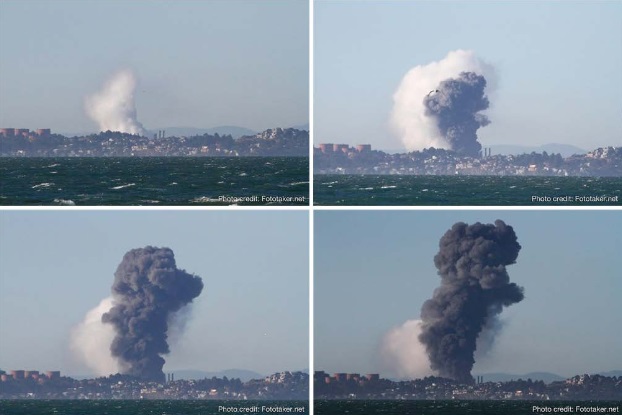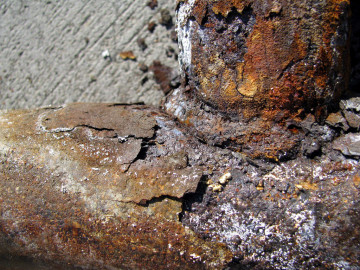Why Should I Care About Carbon Steel Pipe Inspection?

Credit: CSB.gov -Chevron Interim Report
Carbon steel is the most widely used material for piping systems and components in power plants, oil refineries and petrochemical plants, and many other types of industrial and manufacturing facilities. In fact carbon steel actually accounts for nearly 85% of all annual steel production worldwide. It’s used so widely because of its ready availability and relatively low cost. In certain applications however, corrosive chemicals and other environmental factors can lead to severe deterioration and degradation of carbon steel. The good news? Corrosion can be fought by keeping up with prudent monitoring, carbon steel pipe inspections, and repair practices.
While power plants, chemical processing facilities, and oil refineries attempt to run as efficiently as possible, left unchecked corrosion in carbon steel piping systems can have serious or even catastrophic consequences. If you remember the incident at the Richmond, CA Chevron oil refinery plant on August 6th, 2012, you know how important carbon steel pipe inspection and repair is.

Smoke Cloud from Chevron Oil Refinery Fire 8/6/2012
Credit: CSB.gov – Chevron Interim Report
According to a report investigating the cause of the August 6, 2012 incident at the Chevron refinery “a carbon steel pipe within the refinery’s crude oil processing unit failed due to thinning caused by a chemical process known as sulfidation corrosion. The corrosion occurred in a pipe component approximately five feet in length that contained lower levels of silicon than other portions of the pipe.” Prior internal inspections had identified the need to repair corroded components, but the problem was not fixed. Ultimately the pipe failed and a fuel leak led to a major fire in the facility.
There are safety measures that can be taken in order to identify and remedy corrosion problems before they turn into costly disasters. Here are some things to consider when designing your corrosion control program:
- An effective inspection, monitoring and record-keeping process is imperative. Monitoring methods can include both off-line inspections taken during maintenance, and on-line monitoring (using methods such as linear polarization resistance, electrochemical noise, or electrical resistance).
- Select the proper material based on application and plant operating conditions. If the process is subject to chemical corrosion, the proper materials must be specified.
- Replace carbon steel components with more corrosion-resistant materials. Whether the inspection has identified the necessity of new piping or you just want to prevent future corrosion problems, replacing carbon steel components with more corrosion-resistant material is a good idea.
-

Insulation can speed up corrosion, so make sure to frequently have carbon steel pipes inspected.
Insulation can significantly speed up corrosion. Corrosion Under Insulation (CUI) has been an ongoing concern for many years, especially in the petrochemical industry. In fact, one study states that 40-60% of all pipe maintenance costs are caused by CUI and approximately 10% of all maintenance costs a facility faces is due to CUI. Properly installed insulation and application of corrosion protection can help slow corrosion, but regular inspection and material testing under insulation is important. Immediately make repairs to any metal piping or components that show signs of distress from CUI, and replace or repair insulation as necessary.
For companies, this degree of inspection and monitoring effort can seem like a hassle, but the risks of leaving corroded carbon steel pipe and components unrepaired to “run-to-failure” are too great to ignore. For companies that are looking for a cost-effective solution, consider a company that can accomplish inspections in those hard-to-reach, high-elevation areas with qualified professional rope access technicians. Rope access offers big time-saving and low-cost advantages that conventional means like scaffolding and large machinery cannot deliver.
Industrial Access, Inc. provides rope access techniques for applications such as carbon steel pipe inspection and repair to help keep costs and outage time down for companies. Contact us today to further discuss a corrosion control program that will fit in with your facility production and maintenance schedule.



